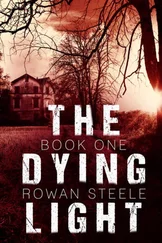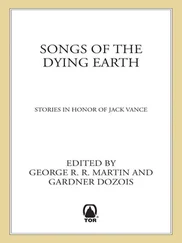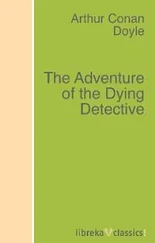Maureen JENNINGS - Except the Dying
Здесь есть возможность читать онлайн «Maureen JENNINGS - Except the Dying» весь текст электронной книги совершенно бесплатно (целиком полную версию без сокращений). В некоторых случаях можно слушать аудио, скачать через торрент в формате fb2 и присутствует краткое содержание. Город: Toronto, Год выпуска: 1997, ISBN: 1997, Издательство: McClelland & Stewart, Жанр: Полицейский детектив, на английском языке. Описание произведения, (предисловие) а так же отзывы посетителей доступны на портале библиотеки ЛибКат.
- Название:Except the Dying
- Автор:
- Издательство:McClelland & Stewart
- Жанр:
- Год:1997
- Город:Toronto
- ISBN:9780771043208
- Рейтинг книги:5 / 5. Голосов: 1
-
Избранное:Добавить в избранное
- Отзывы:
-
Ваша оценка:
- 100
- 1
- 2
- 3
- 4
- 5
Except the Dying: краткое содержание, описание и аннотация
Предлагаем к чтению аннотацию, описание, краткое содержание или предисловие (зависит от того, что написал сам автор книги «Except the Dying»). Если вы не нашли необходимую информацию о книге — напишите в комментариях, мы постараемся отыскать её.
Except the Dying — читать онлайн бесплатно полную книгу (весь текст) целиком
Ниже представлен текст книги, разбитый по страницам. Система сохранения места последней прочитанной страницы, позволяет с удобством читать онлайн бесплатно книгу «Except the Dying», без необходимости каждый раз заново искать на чём Вы остановились. Поставьте закладку, и сможете в любой момент перейти на страницу, на которой закончили чтение.
Интервал:
Закладка:
Maureen Jennings
EXCEPT THE DYING
1997
For Iden, without whose love and support I would never have got to this point
The last night that she lived
It was a common night,
Except the dying; this to us
Made nature different
– Emily DickinsonPrologue
They started with the boots, which looked new. They tried to hurry but their fingers were already stiff and clumsy with cold and the buttons were troublesome. The second boot was particularly difficult. She was curled up on her side against the fence and the leather had fastened to the earth in an icy bond. It took both of them to get it off, one holding on to the frozen leg, by now stiff as stone, the other tugging until the boot came away. Next was the waist, a decent black sateen, but in their haste they pulled on her arm too sharply and they heard the bone snap as the elbow dislocated. “Be more respectful,” said the younger one.
THE SMELL OF THE extinguished candle lingers sharp and sour in the cold air. At the high, small window the night is a paler square but in the room Therese can see only the massy shapes of the wardrobe and the dresser by the door. Since Mrs. Foy left she has been lying like this under the bedcovers, praying for guidance.
It is not the housekeeper Therese fears, it is the other, who, full of solicitude and wine, has already come to her twice this week. The memory makes her tremble and she sits up suddenly, thinking the stairs have creaked. Not so, just the stable door opening in the yard below. Faintly from the dining room, she can hear the booming voice of the guest, the faint interspersing of her mistress’s replies.
She pushes back the quilt and gets off the bed. Except for her outer garments she is fully dressed, but she shivers. Moving fast so there is no room to regret, she packs her meagre belongings into the valise: her second chemise, a pair of drawers, her other grey silk waist for church that she made herself and her plaid wool skirt. Everything else she possesses she is wearing. On the bedside table is the Bible that Claudette gave her when she left the farm. It is a gift that gives her great comfort even though she cannot read a word. Next to it is her rosary, which she picks up, touching the crucifix to her lips. Then she falls to her knees by the bed and begins to tell her beads.
Hail Mary, full of grace,
blessed art thou among women,
Hail Mary, full of grace,
blessed is the fruit of thy womb, Jesus.
They removed the felt hat next. The pink velvet flowers around the brim were crushed by the weight of the head and dusted with snow light as sugar. The skirt came off easily, as did the woollen stockings. There were no gloves and, disappointingly, there was no jewellery to speak of – small silver earrings, which they left, and a pretty bead necklace of green glass that had broken and was wrapped around the rigid fingers. One of them started to pull out the wooden combs that pinned up the girl’s hair. “No, don’t,” said the other. “She won’t need them now,” her companion replied. In the darkness their breath came from their mouths like smoke.
She takes a serge jacket from the hook on the door. She can see her own breath in the cold room, and she wraps her muffler tight around her face. All evening the ice-laden wind has been building, sweeping across the city from the dark lake, worrying at the house. There is a portable oil heater in the corner but she hasn’t used it tonight, not wanting to be held accountable for the additional expense. She does not want to leave with any blot on her name.
Father Alphonse said to her, “If you have difficulties, go to talk to the priest, Father Corbiere. He is my friend, he will assist you.” But she found that this priest has departed and the new one is an English. He appears hurried and has impatience with her language. She cannot tell him her troubles even in the confessional box. But last Sunday she found a French-Canadian church and she wept with the joy of the familiar tongue. Perhaps there she can find succour.
At the last moment she returns to the narrow bed, plumps up the pillow and slips it beneath the blue counterpane. From the door in the dark, it looks like a sleeping figure.
The corpse was clad now only in white flannel drawers and chemise, the blue-grey skin of legs and arms blending with the snow where she lay. They considered leaving her, considered stopping at the final indignity, but the cloth of the undergarments was good and they had gone this far. Awkwardly they manoeuvred the body, unyielding as a large doll. The one was shamed by the triangle of hair in the fork of the legs and she tried to bend the knee up to give the girl modesty, but it was impossible. They bundled up the pile of clothes and slipped away into the darkness.
She crosses the bare floor to the door, opens it and peers out, clutching the Bible against her chest as if it could be a shield. She makes her way to the narrow back stairs the servants use and runs down, her feet made light and fast by fear.
Chapter One
Saturday, February 9, 1895
THE WIND CUT TO THE BONE and Alice Black pulled her shawl tight about her head and throat. The hot gin was a fire in her stomach but no defence against the cold of the winter night. She grumbled to herself, trying to expose as little of her face as she could. She’d expected to do some business at the John O’Neil but none of the piss-makers wanted to pay for a bit of dock tonight. She wiped the back of her hand across her dripping nose. She hoped Ettie had fared better, else it was potato-peel soup for the next few days.
It was getting late. Although the hotel officially closed at the legal Saturday time of seven o’clock, there was a backroom where the regulars could go to top off, and for a cut of the dash, the proprietor, James McCay, usually allowed her and Ettie to stay on.
Alice edged closer to the houses. She was afeard to go past the churchyard where the bodies of the Irish immigrants were laid out in their eternity boxes. Even though the epidemic had happened almost fifty years earlier, for sure ghosts lingered in the area. Not so the cholera. She always held her nose as she scurried by. On this stretch of Queen Street the shops were interspersed with vacant buildings and the boarded-up windows were blinded eyes. The gas lights were few and far between and what with that and huddling into her shawl, she didn’t see the young woman walking in front of her until they almost collided.
“Mind where you’re goin’,” snapped Alice. She heard a muttered “Pardon” as the other one moved out of the way. She had a thick muffler wrapped around her face, but Alice had an impression of youth, and she wondered where the girl was going by herself at this time of night. A country piece, by the look of that hat and valise.
Alice glanced over her shoulder. The girl was hovering on the sidewalk. She looked lost, and for a moment Alice considered stopping to offer help. But sod it, it was too cold. A gust of wind blew her skirts up about her knees and she struggled to hold them down. At that moment she heard the jingle of harness as a carriage came around the corner heading east onto Queen Street, going a good clip considering the state of the road. The iron-hard ruts had a light covering of snow and they were slippery and dangerous to the horses.
“Get out of the way, you bloody bint,” yelled the driver. Alice jumped back onto the sidewalk just in time. She lost her balance on the snowbank and fell backwards, landing on her tailbone. For a moment she remained sprawled on the hard ground, groaning, then angrily snatched up a handful of snow and threw it in the direction of the carriage. The wind tossed it back in her face. Sodding toady. She shook her fist and suddenly the driver pulled his horse up sharp, wheeled around and headed back in her direction. She shrank back, prepared for recriminations, but the carriage went right past her and halted beside the girl. The door opened and a gloved hand reached out. After a moment’s hesitation, the young woman accepted the help and climbed in. In the flickering yellow light of the gas lamp, Alice saw that the carriage was a smart burgundy colour with brass fittings, the high-stepping horse light-coloured, but the blinds at the windows were pulled down tight and she couldn’t see the occupant.
Читать дальшеИнтервал:
Закладка:
Похожие книги на «Except the Dying»
Представляем Вашему вниманию похожие книги на «Except the Dying» списком для выбора. Мы отобрали схожую по названию и смыслу литературу в надежде предоставить читателям больше вариантов отыскать новые, интересные, ещё непрочитанные произведения.
Обсуждение, отзывы о книге «Except the Dying» и просто собственные мнения читателей. Оставьте ваши комментарии, напишите, что Вы думаете о произведении, его смысле или главных героях. Укажите что конкретно понравилось, а что нет, и почему Вы так считаете.










